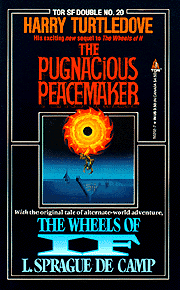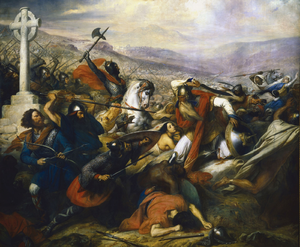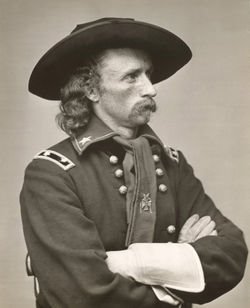Alternate Historian says, sofar we've given more priority to the interface than the content for 2008. Long story short, we've now got the multi-author publishing mechanism Mr Taylor described in May 2006 - the TIAH Magazine. Please email your comments on the interface to the Alternate Historian. A small selection of the best stories from the last three years are repurposed for 2008 and as you can see in the example below, they're fully cited just in case JK Rowling is on the look-out for a writing partner. We really need some fresh stories to build the Magazine and get TIAH moving towards the thousand hits per day site that is our minimum ambition level so please email your stories to the Alternate Historian and do include the post date please. The key point is you can fire the idea over, and let us draft up the story, we're not insisting on final copy. I won't tell Jo if you don't. :-)
.
| L. Sprague de Camp | "But the next night Charles Martel, Mayor of Austrasia lay dead by the banks of the River Vienne, near Tours, with his handsome face waxy in the starlight and blood in his pepper-and-salt beard. The Austrasian line had broken. Yezid, who had been wrong was dead likewise, so was Ya'qub who had been right. And the surviving Franks were fleeing to Barcelona, leaving Northern Europe without a standing army between the Arabs and the Norsemen." In the Wheels of If L. Sprague de Camp described the Frankish defeat at the Battle of Tours in 742 AD, consolidating Arab hegemony in Europe. The destruction of Central European military power gifted the North-West periphery to the Norsemen, sustaining Celtic power in Scandinavia and Great Britain. One consequence was the Viking settlement of North eastern Turtle Island and the subsequent formation of the Bretwaldate of Vinland. The review of the historical masterpiece is available at Eternal Night Review |
 | |
| Historian |
| ~ quotation by Alternate Historian |
 Bataille de Poitiers | In 732, the Battle of Poitiers also called the Court of Martyrs was fought near the city of Tours, close to the border between the Frankish realm and the independent region of Aquitaine. The battle pitted Frankish and Burgundian forces under Austrasian Mayor of the Palace Charles Martel against an army of the Umayyad Caliphate led by Abdul Rahman Al Ghafiqi, Governor-general of al-Andalus. Catastrophically for Europe, the Austrasian line did not hold and Martel was decisively beaten. The Arab army swarmed into Gaul with no effective forces to defend Northern Europe. |
| In 1877, Lieutenant-Colonel George Armstrong Custer was received in Washington with full military honours. Having defeated Sitting Bull and Crazy Horse at Little Big Horn, Custer was already being talked of as a Presidential candidate for 1880. Custer himself knew that he was lucky to be alive. At a crucial moment, he had changed his mind and requested further intelligence. Subsequently he counter-manded orders given to Lt. William W. Cooke for Major Reno's and if not for that, he would instead have been receiving a funeral with full military honours. |  Custer |
 USS Eldridge | In 1976, the Philadelphia Experiment was published by Charles Berlitz. Starting with the invasion of Honshu near Tokyo, codename “Operation Coronet”, Berlitz recounts how the element of surprise offered by the super weapon delivered military success in 1946, ending the war in the Pacific. Berlitz also reveals a darker side to X-Day. The detonation of nuclear weapons at Honshu was neither a military necessity nor a “shot across Stalin's bows”. The inter dimensional teleportation of "Philadelphia Experiment" had torn a hole in space; the bomb was needed to cauterize the wound. |
| In 2007, computer engineer Robert A. Taylor leads a secret life as a blogger of Alternate History under the alias "Rat". He has been captured by mysterious agents who are interviewing him. Rat: Give me my phone call. Agent Smith puts his glasses back on. You disappoint me, Mr. Taylor. Rat You can't scare me with this gestapo cr*p. I know my rights. I want my phone call. Agent Smith smiles. And tell me, Mr. Taylor, what good is a phone call if you are unable to speak? The question unnerves Rat and strangely, he begins to feel the muscles in his jaw tighten. The standing agents snicker, watching Rat's confusion grow into panic. Rat feels his lips grow soft and sticky as they slowly seal shut, melding into each other until all trace of his mouth is gone. |  Robbie Taylor |


1 comment:
Did we not learn that in 1892, during a late evening ceremony, President Benjamin Harrison, was forced to give up the idea of proclaiiming October 12 "Columbus Day"? The stage was stormed by several hundred Cherokee, Sioux, Lakota, and Navaho tribesmen, dressed as Chinese Mandarins.
The frightened Harrison gave up the idea of a Columbus Day celebration, and travelled to Hopi - ville, the capital of the Southeastern Confederation, several weeks later. There, he signed a statement with the Federated Tribes, promising them to withdraw all white settlers eastward, back across the Appalachian Volcano Chain. Harrison said, after his arrival back in Washington, "I don't know which disaster is the worst. The volcanic eruptions in the Carolinas, Virginia, and Pennsylvania; the Indian attacks by tribes using Japanese, Chinese, and Russian supplied weapons; or our forced retreats from the advancing armies of the Republic of Quebec."
He concluded, "We will continue to oppose all forms of imperialist aggression, coming from any direction, and we will fight the forces of Nature themselves, with God's guidance, and a renewed commitment to consolidation and the wisdom of our founding fathers."
Post a Comment